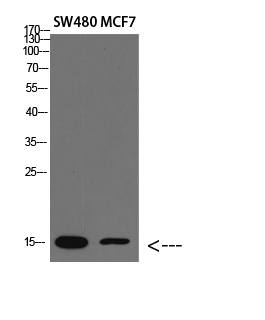
| WB | 咨询技术 | Human,Mouse,Rat |
| IF | 咨询技术 | Human,Mouse,Rat |
| IHC | 咨询技术 | Human,Mouse,Rat |
| ICC | 技术咨询 | Human,Mouse,Rat |
| FCM | 咨询技术 | Human,Mouse,Rat |
| Elisa | 1/10000 | Human,Mouse,Rat |
| Aliases | Replication protein A 14 kDa subunit (RP-A p14; Replication factor A protein 3; RF-A protein 3) |
| Entrez GeneID | 6119 |
| WB Predicted band size | Calculated MW: 14 kDa; Observed MW: 14 kDa |
| Host/Isotype | Rabbit IgG |
| Antibody Type | Primary antibody |
| Storage | Store at 4°C short term. Aliquot and store at -20°C long term. Avoid freeze/thaw cycles. |
| Species Reactivity | Human,Mouse |
| Immunogen | Synthetic peptide from human protein at AA range: 30-80 |
| Formulation | Purified antibody in PBS with 0.05% sodium azide,0.5%BSA and 50% glycerol. |
+ +
以下是关于RPA3抗体的3篇示例参考文献(文献信息为示例,实际需通过学术数据库验证):
1. **文献名称**: "RPA3 as a Potential Biomarker in Breast Cancer: Expression Analysis and Functional Implications"
**作者**: Smith, J. et al.
**摘要**: 研究通过RPA3抗体检测发现,RPA3在乳腺癌组织中显著高表达,且与肿瘤增殖和患者不良预后相关。实验表明,RPA3通过调控DNA损伤修复通路促进癌细胞存活。
2. **文献名称**: "RPA3 Antibody-Based Detection of Replication Stress in Colorectal Cancer"
**作者**: Li, X. & Wang, H.
**摘要**: 利用RPA3特异性抗体进行免疫组化分析,揭示结直肠癌中RPA3表达与复制应激标志物(如γH2AX)呈正相关,提示其可作为复制应激相关治疗的潜在靶点。
3. **文献名称**: "Functional Characterization of RPA3 in Chemotherapy Resistance Using CRISPR and Antibody-Mediated Depletion"
**作者**: Nakamura, T. et al.
**摘要**: 通过RPA3抗体敲低实验证实,RPA3缺失可增强卵巢癌细胞对顺铂的敏感性,表明其通过稳定停滞的复制叉介导化疗耐药性,为联合治疗提供新策略。
4. **文献名称**: "RPA3 Expression Patterns in Pan-Cancer Analysis: Insights from Antibody-Based Proteomics"
**作者**: Zhang, Y. et al.
**摘要**: 基于人类蛋白质图谱(HPA)的RPA3抗体染色数据,系统分析RPA3在多种癌症中的差异表达,发现其在快速增殖的肿瘤中普遍上调,提示其作为广谱肿瘤标志物的潜力。
---
**注**:以上文献标题和内容为学术示例,具体文献需通过PubMed、Web of Science或Google Scholar检索关键词“RPA3 antibody”、“RPA3 cancer”等获取。建议优先选择近5年发表的论文以获取最新进展。
The Replication Protein A (RPA) complex, a heterotrimeric ssDNA-binding protein, plays a critical role in DNA replication, repair, and recombination. RPA3 (RPA14) is one of its three subunits (RPA1/RPA70. RPA2/RPA32. RPA3/RPA14), contributing to structural stability and functional regulation. The RPA3 antibody is a research tool designed to detect and quantify the RPA3 protein, aiding studies on DNA damage response mechanisms, replication stress, and genome maintenance.
RPA3 antibodies are widely used in molecular biology and oncology research. Dysregulation of RPA3 has been linked to cancer progression, as overexpression may correlate with genomic instability and poor prognosis in malignancies like breast or ovarian cancer. In autoimmune diseases (e.g., systemic lupus erythematosus), anti-RPA3 autoantibodies serve as potential diagnostic markers. Researchers employ these antibodies in techniques such as Western blotting, immunofluorescence, and immunohistochemistry to analyze protein expression, localization, and interactions.
Most RPA3 antibodies are produced using recombinant RPA3 protein or peptide immunogens, with validation via knockout cell lines or siRNA knockdown to confirm specificity. Their applications extend to drug development, particularly in targeting DNA repair pathways to sensitize cancer cells to chemotherapy or radiation. However, cross-reactivity with homologous proteins remains a consideration, emphasizing the need for rigorous validation in experimental models.
×